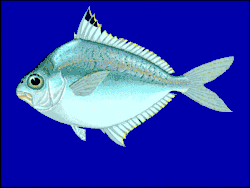Leiognathidae
Leiognathidae, the ponyfishes, slipmouths or slimys / slimies, are a small family of fishes in the order Perciformes.[2] They inhabit marine and brackish waters in the Indian and West Pacific Oceans. They can be used in the preparation of bagoong.
| Leiognathidae | |
|---|---|
 | |
| Eubleekeria splendens | |
| Scientific classification | |
| Kingdom: | |
| Phylum: | |
| Class: | |
| Order: | |
| Family: | Leiognathidae T. N. Gill, 1893 |
| Genera[2] | |
Ponyfishes are small and laterally compressed in shape, with a bland, silvery colouration. They are distinguished by highly extensible mouths, and the presence of a mechanism for locking the spines in the dorsal and anal fins. They also possess a highly integrated light organ in their throats that houses symbiotic bioluminescent bacteria that project light through the animal's underside.[4][5][6] Typically, the harbored bacterium is only Photobacterium leiognathi, but in the two ponyfish species Photopectoralis panayensis and Photopectoralis bindus, Photobacterium mandapamensis is also present.[7] Two of the most widely studied uses for luminescence in ponyfish are camouflage by ventral counterillumination[8][9] and species-specific sexual dimorphism.[5][6][10][11]
Although ponyfish seem quite ordinary and morphologically similar, their light organ systems are highly variable across species and often between sexes.[10][11]
Timeline of genera

References
- Sepkoski, J. (2002). "A compendium of fossil marine animal genera". Bulletins of American Paleontology. 364: 560. Archived from the original on 2011-07-23.
- Froese, Rainer, and Daniel Pauly, eds. (2015). "Leiognathidae" in FishBase. February 2015 version.
- Sparks, J.S.; Chakrabarty, P. (2015). "Description of a new genus of ponyfishes (Teleostei: Leiognathidae), with a review of the current generic-level composition of the family". Zootaxa. 3947 (2): 181–190. doi:10.11646/zootaxa.3947.2.2. PMID 25947728.
- Johnson, G.D. & Gill, A.C. (1998). Paxton, J.R. & Eschmeyer, W.N. (eds.). Encyclopedia of Fishes. San Diego: Academic Press. p. 186. ISBN 978-0-12-547665-2.
- Haneda, Y.; Tsuji, F.I. (1976). "Luminescent systems of pony fishes". Journal of Morphology. 150 (2): 539–552. doi:10.1002/jmor.1976.150.2.539.
- McFall-Ngai, M.J.; Dunlap, P.V. (1984). "External and internal sexual dimorphism in leiognathid fishes: Morphological evidence for sex-specific bioluminescent signaling". Journal of Morphology. 182 (1): 71–83. doi:10.1002/jmor.1051820105. ISSN 1097-4687. PMID 6492170.
- Kaeding, A.J.; Ast, J.C.; Pearce, M.M.; Urbanczyk, H.; Kimura, S.; Endo, H.; Nakamura, M.; Dunlap, P.V. (2007). "Phylogenetic Diversity and Cosymbiosis in the Bioluminescent Symbioses of "Photobacterium mandapamensis"". Applied and Environmental Microbiology. 73 (10): 3173–3182. doi:10.1128/AEM.02212-06. ISSN 0099-2240. PMC 1907103. PMID 17369329.
- Hastings, J.W. (1971). "Light to Hide by: Ventral Luminescence to Camouflage the Silhouette". Science. 173 (4001): 1016–1017. doi:10.1126/science.173.4001.1016. ISSN 0036-8075. PMID 17796582.
- McFall-Ngai, M.J.; Morin, J.G. (1991). "Camouflage by Disruptive Illumination in Leiognathids, a Family of Shallow-Water, Bioluminescent Fishes". Journal of Experimental Biology. 156 (1): 119–137. ISSN 0022-0949.
- Sparks, J.S.; Dunlap, P.V.; Smith, W.L. (2005). "Evolution and diversification of a sexually dimorphic luminescent system in ponyfishes (Teleostei: Leiognathidae), including diagnoses for two new genera" (PDF). Cladistics. 21 (4): 305–327. doi:10.1111/j.1096-0031.2005.00067.x. hdl:2027.42/72092. ISSN 1096-0031.
- Chakrabarty, P.; Davis, M.P.; Smith, W.L.; Berquist, R.; Gledhill, K.M.; Frank, L.R.; Sparks, J.S. (2011). "Evolution of the light organ system in ponyfishes (Teleostei: Leiognathidae)". Journal of Morphology. 272 (6): 704–721. doi:10.1002/jmor.10941. ISSN 1097-4687. PMID 21433053.